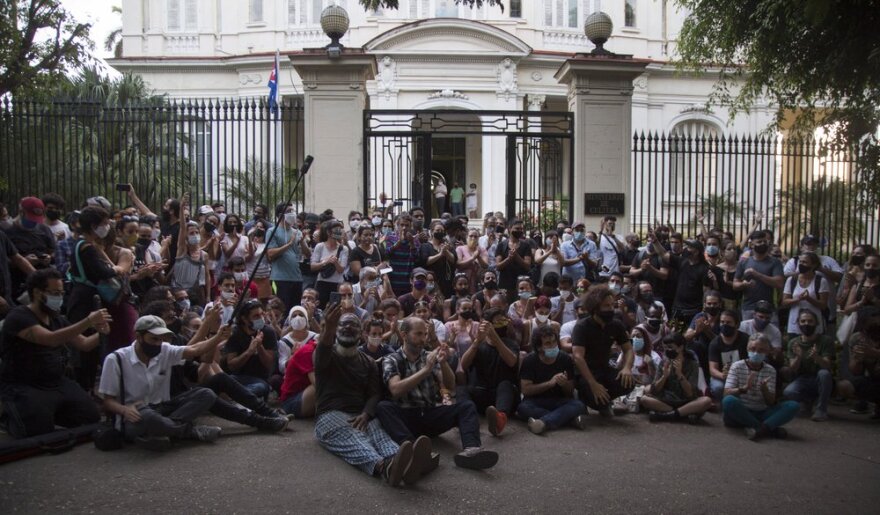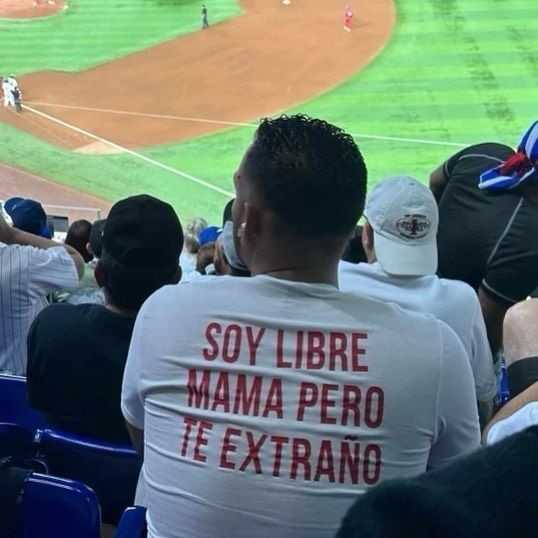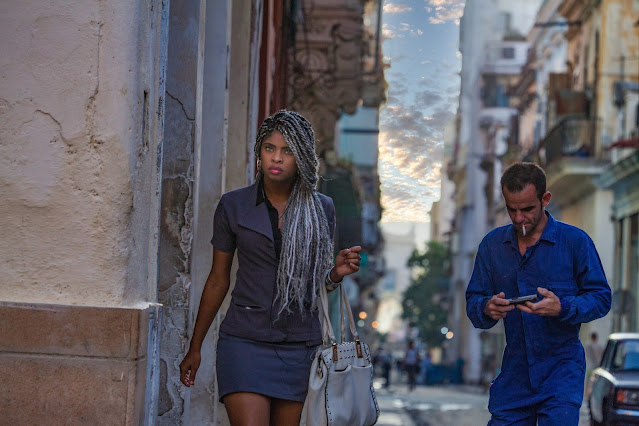On
July 11, 2021 thousands of unarmed Cubans across multiple cities on the island took to the streets to peacefully protest against the Cuban government. As they marched together they were not demanding food, healthcare, housing or vaccines like many Castro and communist sympathizers around the world erroneously claimed. Together in unison they pleaded for one thing: "Libertad" or freedom. With their hands raised up in the air they clearly signed the letter "L" for Libertad and chanted Cuba's new freedom anthem, Patria y Vida.
The Cuban government responded to their pleas for freedom with violence, brutal beatings, and unjust detainment. Over 1000 Cubans were detained and arrested including over 100 minors under the age of 18. More than 620 of them including minors are facing unjust trials and/or prison sentences as long as 20-30 years. Some remain detained without due process. Their only “crime” was marching with thousands of Cubans on that day asking for "Libertad."
Thanks to the expansion of social media access and smart phones in Cuba since first introduced in 2008, the world witnessed these unprecedented events in real time. For the older Cuban generations on and outside the island, the footage captured of these police beatings and arrests were De Ja Vu - all too familiar reminders of a devastating and painful memory in modern Cuban history when a deranged lunatic driven by greed, his hatred for the U.S.A., and hunger for total authoritarian power committed the ultimate betrayal against a nation of peoples who had spent the better part of 400 years fighting for freedom. These were a people whose minted coins in their Republic Era read "Patria y Libertad" or "Homeland and Freedom." To maintain power he killed, imprisoned, or exiled all Cubanos who'd dare speak out against the regime and forcefully instilled cooperation among all others through the threat of persecution, a censored doctrine, and complete isolation from the reality of the outside world. To remind his people of his consequential threats, he changed the motto minted on Cuba's coins to "Patria o Muerte" or "Homeland or Death."

But these mass protests didn't happen overnight by chance or coincidence. These protests erupted on this day as a result of 62 years of pent-up frustrations and unnecessary generational suffering and trauma at the hands of a repressive regime. More specifically, they were a direct result of a series of catalyst events that occurred in the months preceding J11 and the numerous arrests made to artists since 2018 when the Cuban regime passed the law Decree 349, first introduced in August 2018 and enacted on December 7, 2018.
Decree 349 requires that artists obtain advance permission from the Cuban government to conduct private and public exhibitions or performances. Obviously this did not sit well with the artists on the island. In direct response, approximately 16 artists activists founded the group Movimiento San Isidro on September 13, 2018. This same group of artists became the driving force behind the #27N protest leading to the #11J march and have become Cuba's 21st century dissident heroes or freedom fighters whose names have become synonymous with Cuba's new Freedom Revolution.
On November 11, 2020 the Cuban regime sentenced rapper Denis Solis to eight months in prison for posting to his social media a video of Cuban police entering his home without a warrant. In response to this sentencing and the multiple arrests made to the group's members since 2018, fourteen members of Movimiento San Isidro locked themselves inside their headquarters (Otero's home) - six of them begin a hunger strike - to demand the immediate release of musicians/rappers Denis Solis Gonzales (sentenced to eight months of prison) and Didier Almagro (sentenced to three years in prison) while reciting
poetry. They posted their demands on the group's
Facebook page. These activists become known as those
Quartered in San Isidro. Cuban police surrounded them and remained outside the home for fifteen days until November 26, 2020 when the police barged in and arrest, beat, detain, and later release them on house arrest.
The following day on November 27, 2020 another 200+ Cubans planted themselves in front of Cuba's Ministry of Culture in Havana - many on thirst and hunger strike - to continue their protest. This larger protest became known as the
27N collaborative or movement (shown in the photo above). These were their
demands.
Names and short bios of fifteen artists/activists of Movimiento San Isidro including the fourteen members quartered in San Isidro on Hunger Strike inside Otero's home in the old Havana neighborhood of San Isidro are provided below. This list of names is documented in a newly published book from Arsenio Rodríguez Quintana titled "The quartered of San Isidro: Chronicles about the artistic dissidence in Cuba 1961 – 2021 | Crónicas sobre disidencia artística y política en Cuba desde Los Acuartelados de San Isidro hasta 11J."
Luis Manuel Otero Alcantara is the most widely recognized member of this group. He is a performance artist who was arrested a dozen times prior to 27N for exhibiting works that violated Decree 349. He was again arrested for his involvement in the 27N protests - then 3 more times for initiating hunger strike protests. On May 21, 2021 Amnesty International named him "a prisoner of conscience." This recognition garnered him just days later the support of several notable international cultural figures who altogether publicly issued a letter to the President of Cuba requesting for his release. After a 4-week detainment period he was released on May 31, 2021 only to be arrested again without release on his way to join the 11J march on that unprecedented day of mass protests, July 11, 2021. In September of 2021 he was listed as an Icon on Time Magazine's 100 Most Influential People of 2021. He remains in prison to this day without adjudication and on hunger strike.
Maykel "El Osorbo" Castillo Perez is a Cuban rapper/musician and co-author/performer of the two time Latin Grammy Winning song Patria y Vida - the song that's become Cuba's new freedom anthem. He was last arrested in May 2021 indefinitely for his involvement in the recording of this song and remains in detention at a maximum security prison to this day without due process. According to a
Prisoners Defenders' report submitted to the UN Working Group on Arbitrary Detention, Maykel was a victim of 120 repressive acts committed unto him by the Cuban regime in just three years, since 2018. These acts have been attempts to silence him from expressing his demands for fundamental rights and freedoms.
These are the lyrics we wrote and performed that led to his imprisonment in which he describes his experience quartered in San Isidro.
Allí vivimos con la incertidumbre del pasado, plantado
Quince amigos puestos, listos pa’ morirnos
Izamos la bandera todavía la represión del régimen al día
Anamel y Ramón firme con su poesía
Omara Ruiz Urquiola dándonos aliento, de vida
Rompieron nuestra puerta, violaron nuestro templo
Y el mundo ‘tá consciente
De que el movimiento San Isidro continua, puesto
~ Maykel “El Osorbo” Castillo Perez
Anamely Ramos Gonzalez was fired from the University of the Arts (ISA) for exercising her rights to freedom of expression and movement after a twelve year tenure as a professor, researcher and art curator. She was a driving force behind the artistic campaigns against Decree 349 including the “SIN 349” collective. She coordinates arts and cultural projects aimed to preserve the historical memory and forms of organization in Cuba that have been historically censored.
On the night of November 26, 2020, she reported that Cuban military soldiers, dressed as doctors, forcibly imprisoned them alleging it was attributed to the spread of the coronavirus. She says they were beaten, disappeared for several hours, and sentenced to house arrest; their only crime was reciting poetry to demand the freedom of rapper Denis Solis.
Read more
Omara Ruiz Urquiola is a former Cuban professor who was brutally beaten by a police motorcycle patrol officer on November 13th, 2020, as reported by the International Society for Human Rights (ISHR). She posted the video of the assault on Facebook along with her blood-smeared dress worn during the assault. She has also suffered from breast cancer for years. She became a target of harassment by the Cuban government when her brother,
Ariel Ruiz Urquiola, biologist, environmentalist and former professor/researcher at the University of Havana, denounced Cuba's unsustainable fishing practices of sea turtles. In 2018 he was fired, arrested and sentenced to one year in prison for starting a hunger and thirst strike to obtain cancer treatment for his sister, Omara. He claims to have been deliberately infected with HIV at a Cuban hospital and was later released from prison following another hunger strike.
Read more
Esteban Lazaro Rodriguez is a journalist and host of ‘El Barrio Habla" where he live streams broadcasts on ADN Cuba's social media platforms, interviews democratic activists in Cuba, and reports stories of Cuba's most vulnerable citizens including homeless victims of landslides, poverty and other common problems. Among his live recorded broadcasts is that of his arrest at his home in Havana on August 4th, 2020 at the hands of uniformed and non-uniformed state officers. He was again arrested on April 30th, 2021 while participating in a protest in Obispo to support fellow artist Luis Manuel Otero Alcántara who at the time was on hunger strike in his home while surrounded by the police.
Read more
Iliana Hernández Cardosa is a Cuban activist, reporter for CiberCuba in Havana, cyclist, model, and dancer. She emigrated to Spain in 1996 to study Dental Prosthetics and Community Management and appeared and doubled for leading actresses in movies and tv series. She repatriated to Cuba where she created, presented and produced Lente Cubano, an audiovisual program that captured the Cuban reality through culture, citizen denunciation, promotion of private businesses, and dissemination of known and unknown artists on the island. In September 2016, she launched the program in Miami and was warned upon her return to the island at the same airport about its content and in particular, its section "Citizen Denouncements" which circulated on the Internet and through El Paquete. This made her a target of State Security and in February 2017 she was arrested in Old Havana and stripped of her personal belongings. Cardosa is also the co-founder of Somos+ movement. Read more
Katherine Bisquet is a writer, poet and published author with a degree in Literature from the University of Havana. Her poetry books "Algo aquí se descompone" (Colección Sur Editores, Havana, 2014) and "Ciudad Nuclear mon amour" (Ediciones Sinsentido, Havana, 2020) are available for purchase online. She was the curator of the #00 Havana Biennial 2018. Bisquet was the recipient of the Can Serrat Primavera Barcelona Writers Residency in 2020; the Antonia Eiriz Fellowship in 2021; and the Hannah Arendt International Institute of Artivism (INSTAR) award for her chronicle book project Los mojados. Her poetry, chronicles and interviews have been published in magazines and newspapers such as Vice en español, El Estornudo, Hyperallergic, Hypermedia Magazine or Rialta Magazine.
Read more
Oscar Casanella, a biochemist by profession, was was a Professor at the Faculty of Biology of the University of Havana and a researcher at the National Institute of Oncology and Radiology and was expelled from both institutions in 2016 after being questioned by State Security for his affiliation with the country's dissidence. In November 2020, he was persecuted, beaten and arrested by the regime's security forces on several occasions for his participation in the protests of the San Isidro Movement. He was forced into exile to Miami, FL on January 12, 2022. His departure is the latest in a wave of forced exiles of activists.
Read more
Abu Duyanah (pseudonym of Niovel Alexander Tamayo Formén) is a Cuban writer and human rights activist. He is the founder of the non-violent Demóngeles movement, whose purpose is to claim the rights of free-expression artists. He participated in the Friendship Movement which held a series of events to demonstrate its main pillar - non-violence. In 2010 he adopted the Muslim religion and became the first Cuban to make a trip to Mecca. In 2012 he founded the Cuban Association for the Education of Islam. The Cuban regime is persecuting him for his oppositional art, human rights demands, and his Muslim religion. He lives in Havana and continues to write literature, working on the Demóngeles project and the independent media ADN Cuba. Read more
Yasser Castellanos is a Visual and Spoken Word artist. He graduated from the Enrique Jose Varona Superior Institute of Education, As a member of Grupo UNO, he helped organize the Cuban Rap Festivals. Around 2009, his artistic expression took on more social or political themes capturing the aesthetic of printed materials of the past using block colors and contrast he would see on comic strips, T-shirts, political billboards and movie posters as a child. His exhibited works at #00 Havana Biennial were met with governmental backlash, along with others, leading to the passage of Decree-Law 349.
Read more
Osmany Pardo Guerra was first arrested and sentenced to one year of home confinement by the Cuban government in March 2021 for playing the song Patria y Vida inside his home. He was also among those quartered in San Isidro on hunger strike and detained temporarily. Read more
Osmel Adrián Rubio Santos, a self declared "conscientious objector," was among the hunger strikers quartered at the headquarters of San Isidro Movement and placed under house arrest as a result. Throughout his house arrest he was harassed by his neighbors for his political views and sexual orientation. On December 15, 2020 he was arrested immediately upon leaving his house and go to a grocery store.
Read more
Humberto Mena, known as "Joker," is one of fourteen artists who were quartered for days at the headquarters of the San Isidro Movement (MSI) to demand the release of rapper Denis Solís. Upon ending his hunger strike on November 19, 2020, he went home and was arbitrarily detained and temporarily disappeared. In January 2021 he posted this video to his Facebook account to document all the police surveillance activity that follows him. Read more
Jorge Luis Arias is a 21-year old a activist and member of the San Isidro Movement who was quartered at their headquarters in protest. He has passionately and publicly advocated for non-violence, claiming that "The San Isidro Movement is against all violence, our movement is a pacifist movement." Watch his posted
video here.
Anyell Valdez Cruz is a mother of four and among those members quartered in San Isidro headquarters. She was relatively unknown prior to this act but has since become the target of harassment and acts of repudiation by the Cuban regime and its supporters. She claims they have been trying to remove her from her home of five years. In February 2021, State Security agents jumped the fence outside her home and painted over the words Patria y Vida she and Rubio had painted on her wall. Read more











Comments
Post a Comment
Please feel free to share your #soscuba story here. If you would like to be featured on this page, please Submit Your Story online at cubanswithwings.com